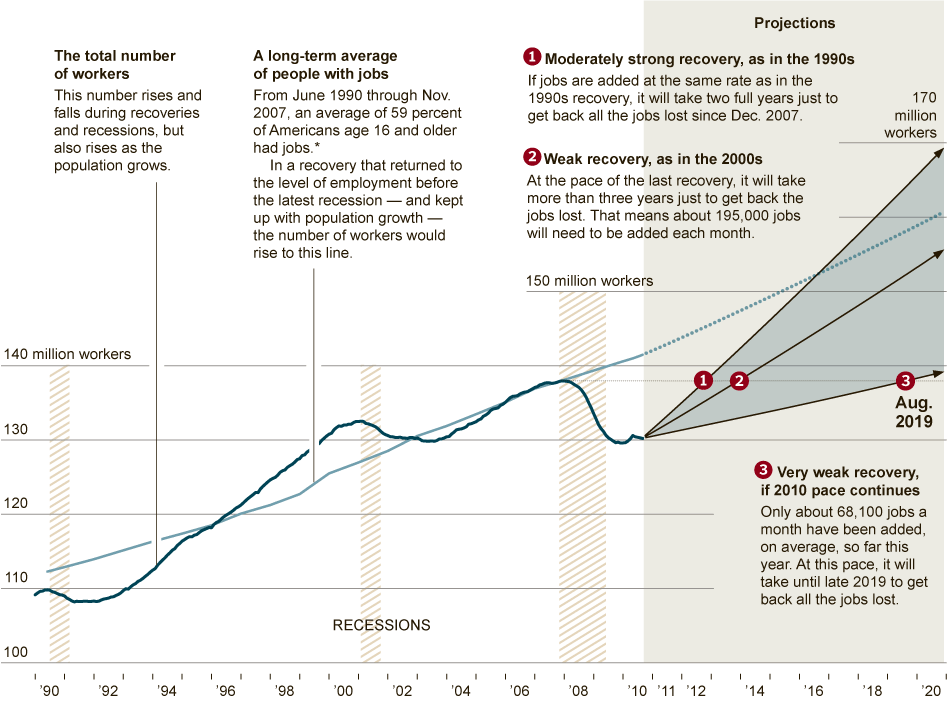As our elected officials have started to come to terms with what they’ve done:
The financial services industry is growing increasingly concerned as more politicians get behind the idea of a broad moratorium on home foreclosures, which banks and many outside analysts say could be good short-term politics but terrible long-term policy.One senior Wall Street executive told Morning Money over the weekend: ‘President Obama should be very cautious about aligning himself with Congressional leaders who are playing politics with the foreclosure issue. With foreclosed properties comprising one in every four homes sold in the United States, the spreading moratorium could disrupt real estate deals in progress, slow down the process of clearing the backlog of troubled home loans and [endanger] the economic recovery.’
“The recovery” meaning financial markets, not the economy that you and I actually live in, which is stagnant:

Now there are a number of details that have been drowned out by the massive public relations campaign that’s been put forward on this such as this New York Times article. There’s a wonderful quote to describe this: “The most effective propaganda paradoxically uses information to drive information out of circulation.” It was the same thing when the crisis started and we heard about all kinds of derivatives–which are problematic–rather than the massive housing bubble that they filled. Curiously, that will actually help to explain the MERS problem.
MERS is an electronic mortgage registry database that was used to speed up the whole process of securitizing these loans faster than they could keep track of who actually owned the properties they were for. See this NYT article from 2009 describing the system. The key quote is this:
MERS, a tiny data-management company, claimed the right to foreclose, but would not explain how it came to possess the mortgage notes originally issued by banks. Judge Logan summoned a MERS lawyer to the Pinellas County courthouse and insisted that that fundamental question be answered before he permitted the drastic step of seizing someone’s home.
“You don’t think that’s reasonable?” the judge asked.
“I don’t,” the lawyer replied. “And in fact, not only do I think it’s not reasonable, often that’s going to be impossible.”
If they really believed they were worth multiple trillions of dollars, you’d think they’d spend the time to make sure they could take back these valuable properties, but of course they didn’t, which was why it was a multi-trillion dollar bubble. If you’re pawning something off on people, you want them to take it off your hands for more than its worth so they are the ones stuck with it and you’re gone when they realize it’s not worth what they paid. The person in that position is here is the real estate broker, the lender assumes the deed to the property and is supposed to take a loss if the buyer can’t actually pay for it. For assuming this risk they take interest on the loan. What we have been surrounded by is a bizarre “bank always wins” mentality. It’s having your cake and eating it too, then getting another one when it’s gone.
This is why the bizarre decision to preserve the debts that couldn’t be paid by doing a creditor bailout was so terrible, not “taxpayer dollars” which were far less than they’ve gotten in loan guarantees and access to the fed’s discount window. The recipients of that money often pay a 15% capital gains tax rate on their alleged “investments” compared to the 25% income tax anyone who makes more than $34k a year pays and all of the sales taxes people pay for necessities. Even people who have been able to keep up with their mortgage payments are in “negative equity” and paying for a loan on a house at bubble levels despite the bubble bursting.
Only under such a uniform standard could we so easily determine who the houses belong to. Only under an effective media blackout could the NYT print a story attributing the “foreclosure issue” to something so mundane without embarrassment.

